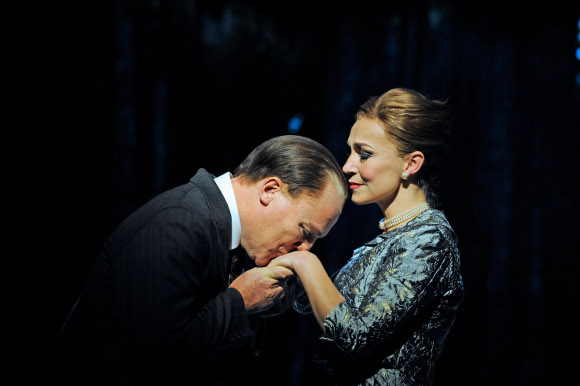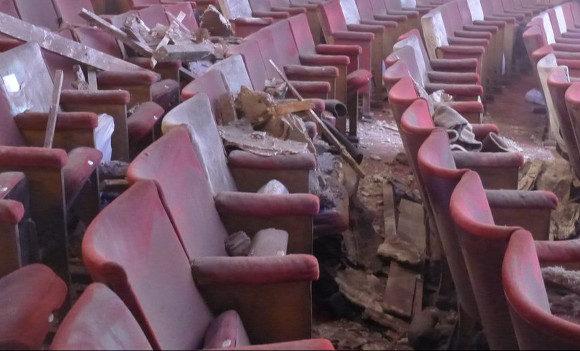Michael Coveney: Disaster on the Avenue as Stephen Ward opens in the Aldwych
Last night’s ceiling collapse at the Apollo Theatre coincided with the press opening of Andrew Lloyd Webber’s latest musical

© Nobby Clark
"Nightmare in Theatreland" screams the banner headline of this morning's Daily Mail, and it's not a review of last night's big West End opening, Stephen Ward at the Aldwych. The mad mystic Antonin Artaud described theatre as the sky falling in upon us, but you don't expect the theatre ceiling to fall in as well: theatre is about raising the roof, not dragging it down.
Nobody killed, thank God, at the Apollo, where a virtually packed audience (the theatre holds around 780 people) was watching The Curious Incident of the Dog in the Night-Time; but what a catastrophe, not least for the Nimax group – co-owned by Nica Burns and Max Weitzenhoffer – who acquired the Apollo, along with the Lyric, Garrick and Duchess, from Andrew Lloyd Webber's Really Useful Group in 2005.
I thought something odd was going on when, just as Joanna Riding was launching into the take-home song from Stephen Ward, "I'm Hopeless When It Comes To You," a suited flunkey stole into the Aldwych stalls and bent down to speak into Lloyd Webber's ear; it was a bit like that memorable photo of George Bush being told about 9/11.
Twenty minutes later, after Lloyd Webber had made an effusive speech from the stage thanking his collaborators and Richard Eyre, the director, and saying how thrilled he was to be part of something that might conceivably change the world (although there is nobody, surely, who doesn't now think that Ward was indeed a scapegoat in the 1963 Profumo affair?), Madeleine Lloyd Webber staggered into a side-office in the stalls corridor, blankly reciting, "There's been a disaster at the Apollo."

© Chris Edwards
Things had been going fairly well up to this point, although the second act of Stephen Ward loses emotional and narrative focus in direct proportion to the noose tightening around the hero's neck. A lot of the musical writing in the interview and trial scenes is strictly utilitarian by ALW’s standards – after the brilliance of the first act both in the songs themselves and the underscoring between them – and the trial itself (and a lot of the acting) has no more visual allure than an episode of Crown Court.
It's curiously as though a 1960s satirical romp has morphed into a weaker imprint of a David Hare play (Murmuring Judges comes to mind) enlivened with the odd shaft of musical intelligence and, of course, Mandy Rice-Davies' famous line when told by the prosecution that David Astor had denied having sex with her: "Well, he would, wouldn't he?"
With her superb song, Joanna Riding as Valerie Hobson, the actress wife of John Profumo (played with a vulpine randiness by Daniel Flynn), also makes you wonder if we shouldn't, after all, be watching a musical about the cabinet minister whose life was ruined by the affair but who redeemed himself in social work in the East End of London.
Ward's after-hours activity as a society osteopath – and he made no bones about it – rendered him highly vulnerable to any mud-flinging by a hypocritical establishment, though the show itself, having sketched in his club land clientele including Lord Boothby (a notorious alcoholic bisexual whose mistress was the wife of the Prime Minister, Harold Macmillan) and the Kray twins from gangland, doesn't quite stitch in the side-issue of Christine Keeler's underworld contacts in Notting Hill, nor does the shooting incident make any sense in the overall context.
There's something odd, not very kosher, about Ward putting up these young girls in his flat and not having sex with them, serving a party scene with contacts and introductions. But Alexander Hanson plays him with a cool, James Bond-style lustre, singing beautifully throughout and registering an inevitability about his fate with a hopeless shrug.
For those of us who remember the era – just about, in my case – there's a ghoulish fascination, too, in seeing figures like racketeer slum landlord Peter Rachman, discredited Tory Home Secretary Henry Brooke and the unimpeachable QC Sir Peter Rawlinson, who sold his house in the country to Maggie Smith in 1981, brought fleetingly to life. Not to mention Keeler and Rice-Davies themselves (both still very much alive) and both very wittily played by the two Charlottes, Spencer and Blackledge, especially in the 1963 ("Yeh, yeh") parody pop song.
I wonder what Cilla Black, sitting over the aisle from me, made of that one. It was one of those first nights where various showbiz and intellectual factions collided, chiefly because of what must have struck many of them on either side as an unholy alliance between Lloyd Webber and Richard Eyre.
Cilla was along the row from Andrew's brother, cellist Julian, while I was sitting behind Guardian editor Alan Rusbridger ("My first Lloyd Webber," he whispered before his phone went off in a quiet moment) and two rows ahead of novelist Ian McEwan. And the interval throng included both journalist Tom Mangold and barrister Geoffrey Robertson (married to the demonstrative Aussie novelist Kathy Lette, sucking Andrew's face at one point) who had set the composer on Ward's case a few years ago after a chance social meeting; Mangold writes two illuminating articles in the unwieldy souvenir brochure, while Robertson has written a book to complement the production and add to the already available definitive account by Richard Davenport-Hines.
The second best song in the show, "This Side of the Sky" – a really beautiful, sinuously melodic duet for Ward and Keeler – put me in mind of that Artaud quotation and nagged away as I watched the awful television pictures outside the Apollo when I got home. No-one really knows yet what caused the collapse, but there is a possibility that a heavy thunderstorm had somehow perforated the membrane at the top of the building and pressed down onto the plaster ceiling.
The last time this happened was in 1973 when the ceiling fell into the Shaftesbury Theatre on the night of the 1,998th performance of Hair. The place closed down, was threatened with redevelopment, but preserved as a Grade II listed building (like the Apollo), re-opening a year later with a production of West Side Story.
Nimax, like most theatre groups, now adds a highly controversial £1 restoration levy to each ticket they sell following "established practice" on Broadway. It's clear that this fund – "to assist essential work of preservation" – has been either insufficient for the intended purpose, or spent on the wrong things. Any future enquiry will have to look very closely at the legality and practicality of this levy and to what extent the government might have to assist in – and indeed insist on – a thorough survey and overhaul of all the historic theatres in our capital. Not a good end to the theatre year, but Happy Christmas all the same.












